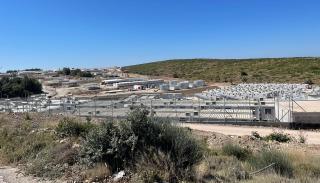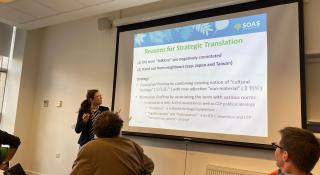
Breadcrumbs navigation
What does increased global displacement mean for the global system of nation states?
We live in a world in which 82.4 million people worldwide are forcibly displaced. Whilst migration has been an enduring feature of humanity, the concept of borders and bordering is a relatively new phenomenon, one associated with European modernity and colonialism. Borders and the so called protection of borders have led to a situation in which people fleeing persecution and war find themselves stuck in complex asylum systems in the border zones of nation states, often for many years, in appalling conditions. Within these systems the protection of bordered states, rather than the protection of human lives, is often made the policy priority. You only have to look at the UK’s new Borders Bill and its focus on limiting entry and securing the imagined border as evidence of this.
In thinking about these questions this project focuses in many ways on the intersection between activism and academia and what it means to draw on activist principles in academic work. A BISA Early-Career Small Research Grant funded the first stages of a project to explore alternative approaches to organisation beyond and outside of nation states. It enabled a ten week period of time to be spent working alongside and learning from displaced people, NGOs and activists filling support gaps in one of the European Union’s border regions, the Aegean island of Samos in Greece. During this time I was able to work with Project Armonia, a project that developed a kitchen and restaurant working with the displaced community on the island to provide meals that were healthy, nutritious and representative of the many nationalities ‘sheltered’ in the Reception and Identification Centre on the island. During this period of time (May to July 2021) asylum provision on the island was in a transition period with a planned move to a new facility in a remote part of the island. This move took place in September 2021 with the opening of the Zervou ‘closed and controlled’ Multi-Purpose Reception and Identification Centre. This was the first MPRIC to be built across the five Greek ‘hotspot’ islands of Lesvos, Chios, Samos, Leros and Kos and as such there were a lot of unknowns about what this would mean for the people who would be transferred there. While I was working with Project Armonia we recognised the concerns people had about this and the need to share these beyond the island. As such we worked with the Armonia community to share stories and concerns from the island, putting together a policy brief, Voices at the Border, which touched on concerns about the distance of the MPRIC from the support networks in the town of Vathi, the prison-like structure, and the role this might play in limiting peoples freedom of movement on the island.
I have been working on questions of refugee support, activism and camp conditions along the ‘Balkan Route’ since 2017 and have spent time on the island of Samos, for time periods ranging from a few days to 10 weeks, since 2018. Within that time the situation has changed continuously with the conditions faced by displaced people going through the asylum process on the island often going from bad to worse. In witnessing this what has become clear are the failures of not only Greece as a nation state to plan effective and relevant support, to ensure proper access to healthcare, education, efficient and fair asylum processes, hygienic facilities and nutritious food, but also the European Union’s reliance on border states for delivering asylum procedures focused on protecting borders. This was made ever clearer in March 2020 when the President of the European Commission thanked Greece for acting as Europe’s ‘shield’, a framing that not only demonstrates the policy prioritisation of the border but also the othering logic inherent in decision making processes, of who should and who should not, have freedom of movement within the European Union. These framings raise questions about gaps in asylum support, approaches to thinking about and engaging with displacement at the policy level, the inherent logics underpinning decision making, and the role and value placed on borders and their protection. The purpose of this project, then, is to think about possible alternative approaches to structuring society that looks beyond bordered nation states, and to draw on the experience and knowledge of support networks at Europe’s borders to think through these questions. The period of research kindly support by BISA’s grant is a first step in a larger project focusing on alternative approaches to thinking about world order, and the lessons that can be learnt from small scale initiatives and solidarity networks for organising that places the focus on human beings rather than borders.
Gemma received a BISA Early-Career Small Research Grant to help with this research. You can find out more about all our funding on our funding page.


